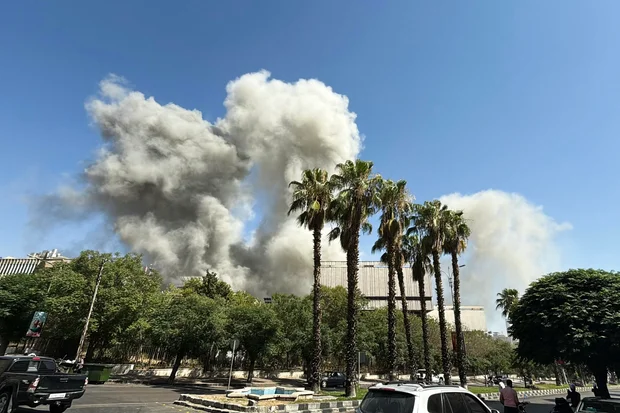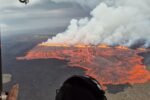The Israeli military launched a rare airstrike in the heart of Damascus on Wednesday, targeting the Syrian Defense Ministry headquarters. This action, coming hours after a drone strike on the same building, prompted a call from the Trump administration for “the fighting to stop” as intense clashes continued in the southern Syrian city of Sweida. Syrian state media reported a “number of casualties” from the Damascus strike, without providing further details.
Israel’s Intervention and Escalation Vow
For days, clashes have raged in Sweida, the capital of its namesake province, between Syrian government forces and Druze armed groups. In response, Israel has initiated a series of strikes targeting government troops and convoys, asserting that these actions are in support of the Druze religious minority group. Israel has also vowed to escalate its involvement and has beefed up its forces along its border with Syria.
Following the Damascus airstrike, Israeli Defense Minister Israel Katz stated on X that the “painful blows have begun.”
U.S. Expresses Concern and Seeks Stability
The Israeli strikes have raised considerable concern in Washington. The Trump administration has recently endeavored to assist Syria’s new government in consolidating control and fostering international ties, including lifting a wide range of sanctions against Syria in late June. Treasury Secretary Scott Bessent had previously stated these moves were intended to encourage investment and help Syria become a “stable country that is at peace.”
On Wednesday, U.S. Secretary of State Marco Rubio articulated the Trump administration’s deep concern: “We are talking with all relevant parties on all sides. We want the fighting to stop.” Rubio characterized the clashes around Sweida as a “direct threat to efforts to help build a peaceful and stable Syria,” confirming ongoing and constant talks with the governments of Syria and Israel.
Sectarian Tensions and Casualties in Syria
Syria’s new, primarily Sunni Muslim government, which came to power after a rebel offensive ousted Bashar Assad in December, has struggled to consolidate control and faces suspicion from the country’s religious and ethnic minorities. Fears among these groups intensified after clashes in March between government forces and pro-Assad armed groups escalated into sectarian revenge attacks, resulting in hundreds of civilian casualties from the Alawite religious minority, to which Assad belongs. A report by DW in July 2025 indicated that nearly 1,500 Alawites were killed in March, with the Syrian Network for Human Rights documenting 803 extrajudicial killings between March 6-10, 2025, primarily in Latakia, Tartus, and Hama, including 39 children and 49 women.
The Syrian Defense Ministry had earlier accused militias in the Druze-majority area of Sweida of violating a ceasefire agreement reached on Tuesday. However, reports persist of government forces attacking Druze civilians, with testimonies describing family members trapped amid communication blackouts and alleged shootings.
The latest escalation in Sweida began around July 11, 2025, with tit-for-tat kidnappings and attacks between local Sunni Bedouin tribes and Druze armed factions. Government forces intervened, leading to clashes with the Druze. Videos circulated on social media depicting government-affiliated fighters humiliating Druze sheikhs and desecrating Druze symbols, while other videos showed Druze fighters assaulting captured government forces.
No official casualty figures have been released since Monday, when the Syrian Interior Ministry reported 30 deaths. However, the UK-based monitoring organization, the Syrian Observatory for Human Rights (SOHR), reported as of Wednesday morning (July 16, 2025) that more than 250 people had been killed, including four children, five women, and 138 soldiers and security forces. SOHR specifically noted that at least 21 people were killed in “field executions.” Other reports indicate the death toll in southern Syria has risen to 248, including 92 members of the Druze minority (28 civilians, with 21 killed in summary executions by government forces), along with 138 Syrian security personnel and 18 allied Bedouin fighters.
Interim President Ahmad al-Sharaa issued a statement condemning the violations, vowing accountability for perpetrators “whether from individuals or organizations outside of the law.” Despite this, a retired Druze IDF general, Amal As’ad, has accused Syria’s Sharaa of seeking to “eliminate the Druze.”
The Druze: A Minority Caught in the Conflict
The Druze are a distinct religious sect that originated as a 10th-century offshoot of Ismailism, a branch of Shiite Islam. Globally, their population is estimated to be between 800,000 and 1 million. More than half of the world’s Druze population lives in Syria, estimated around 624,000 prior to 2011. Significant Druze communities also reside in Lebanon (around 250,000) and Israel (around 119,000, including those in the Golan Heights, which Israel captured from Syria in 1967 and annexed in 1981).
In Israel, the Druze are largely seen as a loyal minority and frequently serve in the military. In Syria, however, the Druze community has been divided on how to approach the new government, with some advocating for integration while others remain wary and push for an autonomous Druze region.
Israeli Defense Minister Katz stated that the Israeli army “will continue to attack regime forces until they withdraw from the area — and will also soon raise the bar of responses against the regime if the message is not understood.” Prime Minister Benjamin Netanyahu emphasized Israel’s commitment to maintaining a “demilitarized area on Israel’s border” and an “obligation to safeguard the Druze locals.” MG Ori Gordin, commander of the Israeli military’s Northern Command, confirmed that the IDF is “operating decisively” and “increasing the pressure and the pace of the strikes” throughout southern Syria, including Damascus.
Israel has maintained an aggressive posture toward Syria’s new leadership since Assad’s fall, citing concerns about Islamist militants near its borders, despite the U.S. and other nations recognizing the new government led by al-Sharaa.







